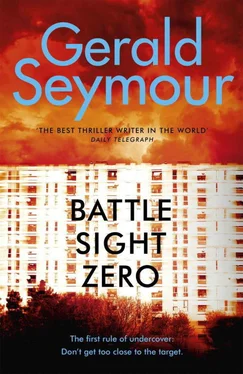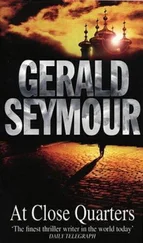‘Eat your food, Gough. Enjoy.’ She topped up his glass, filled it to the brim.
‘I cannot estimate how he will shape up. Don’t know where he is. I have a duty of care, am supposed to have, but it’s abrogated.’
‘Less time worrying about him, Gough, more time worrying for yourself – and worrying about what happens to me. If we lose the package, worse, if we lose our asset, you and I will be so alone. No one will stand our corner, and…’
She stood. Her plate was less than half cleared. He might have had a few small bites at his chicken. She cleared her glass, gestured for him to empty his. She walked to the counter and put down 100 euros in notes. She picked up the order pad, tore off a couple of sheets, and would fill them in later, do it with left-handed script. She led him out of the door. The wind caught them on the street, narrow and poorly lit, cobblestones rough under their tread.
‘Sorry and all that, Gough, but we need to get close up, personal, do it better than we did last night. Or we might as well get on the first plane out. Ditch it. Cannot leave him much more bare-arsed than we’ve already done… Agreed, it would be nice to win sometimes.’
He felt crushed, emotion drained, no ambition. They walked arm in arm.
Out in the city centre, by the hospitals and the principal cemetery – on Rue d’Orient – Major Valery prepared for bed. He had a routine. Had followed it since the start of his duty in Marseille after his transfer from the north. He thought that routine as relevant now, or more so than when he had brought his children and his wife here from the city of Lille.
The children were now in bed.
His wife had spent the evening preparing for tomorrow’s classes, but was now upstairs, undressed, in bed, reading. First he turned off all the lights on the ground floor. Then he would sit a full fifteen minutes in darkness and would listen to the sounds of the street: then he would check the pictures from the discreetly sited cameras that covered the front and rear of the property. Then he would go upstairs, his pistol in his hand, would change into his pyjama, would go to his side of the bed. The pistol and his mobile phone would be placed on the table, next to the lamp.
He could not have accurately measured the threat to himself – or to those he loved. The Major, of course, was reasonably trained in the art of personal survival. He could shoot straight, could be effective in unarmed combat, could use a baton and strike an enemy’s shoulder close to the neck, disable with the intensity of the pain. What he could not do was be present for the school day to protect his wife, now concentrating on her book – nor safeguard his children, one sleeping quietly and one with a hacking winter cough. He assumed a real and clear-cut threat existed. He might not know the names of all those men who sat in the rotten core of the city’s commerce and who had reason to hate him. His defiance of their power and influence was fostered in his refusal to accept bribes, arrangements that would benefit him… there had been another attempt to suborn him that evening. So blatant. A Mercedes car parked outside L’Évêché, a message sent inside from the outer gate telling him that he would learn something to his advantage if he came out of the building and spoke to the driver. He had come. Through the opened window of the costly black saloon had been offered a tightly wrapped package. It might have contained 20,000 euro, might have been 30,000, might have been a long lens image of his children in the playground, of his wife returning from the weekly shop, bags around her feet as she fished in a pocket for the key. He had seemed to reach for the package, as if accepting it, and it had been released, but he had not grabbed it. It had fallen in the dirt. He had turned, walked away, and the courier would have had to leave his car, walk round it, pick up the padded envelope, return it whence it came. He would have made those enemies angry, and the ones in the Town Hall, and the councillors and those in positions of patronage, and the gangsters when he took them off the street.
He would climb the stairs. He would go to the bed and lay the pistol and the mobile phone beside the lamp. The weapon would be armed, the safety engaged. The bell on the phone would be turned low… He barely thought of the English detective team, trying to do a job for which the necessary budget was not available. He turned out the light. He slept lightly. He liked to have the pistol close, and needed to have the phone beside it.
The room was clean. The bed was covered with a white sheet and a floral duvet. A print on the wall showed a view of the vieux port . Outside, a radio played New Orleans jazz. A wardrobe covered half of the wall between the door and the bathroom. An easy chair was lodged by the window that looked on to the square below. The curtain was drawn but thin, and the snap of the wind penetrated the open window and fluttered the material. On another wall was an Impressionist’s view of Les Calanques, steep white stone cliffs that were brutally sharp and the sea beneath the rocks was gentle. A forgettable room, suitable for those anxious to hurry on with their lives.
A strip of light shone at the bottom of the bathroom door.
They’d had a café supper, meat and salad, ice-cream and coffee.
Andy Knight – a temporary name with a personality easily altered to suit necessities – sat on the bed. Little said at supper and neither of them drinking alcohol. Total inevitability recognised. Not much of a room and a noisy bed which would not inhibit them. He had opened his bag, pondered what to take out, gone for clean socks and a clean shirt, and a wash bag. Had cleaned his teeth, had undressed, was on the bed, naked, waiting… she had gone to the bathroom and had carried a nightdress with her.
He supposed the problem was solved. It had not arisen when he had taken on other legends. She’d washed and the plumbing reacted with a gurgling in the pipes. The toilet flushed, then the taps ran again… He could tell himself that it was what they both wanted. He saw the stern face of the Detective Chief Inspector, and the contempt at the mouth of the civilian woman, and the hypocrisy was rank because both, so obviously from their body language, did hard humping. Relationships between officers on a team was as frowned upon as sex by an Undercover with a target… they were Gough and Pegs. He had no name, had glanced at her passport and seen that she used a phoney one with the actual photograph but a different identity.
He had been an ‘action’ man, had walked as a volunteer into a ‘heart of danger’, had been admired, praised for his ‘dedication’, might have been a combat hero but for the camouflaged hole burrowed out by a buck rabbit on the common above Lympstone, but understood little of women, had never known a long, serious bond, something that might have a future.
The door opened. she switched off the light. She wore the nightdress, and the curves of her body were well shown by it… He thought her more nervous than he was.
One problem settled, another rose to take its place.
Would he…? Would he turn her in…? She sat beside him, then reached across him and the bare skin of her arm brushed his chest. Would he? Probably would. Would she do her double damnedest to kill him if she knew the truth of his loyalties? Probably would… They were touching, like young lovers, clinging to the vestiges of innocence: were able to do that because the lies lived strong and well.
Turn her in, shop her, tout on her? What loyalty, after doing it on a noisy bed above the square by the street market in central Marseille, was she owed? Did affection exist? Questions and issues rampaged. Lust or love, or just eating what was piled on the plate and in front of him? The last thing he saw clearly on her face was shyness. Her hand was on the stem of the bedside light and it wriggled to find the switch. It clicked. She was a shadow, barely lit by the lamp in the square, filtering through the curtains.
Читать дальше












